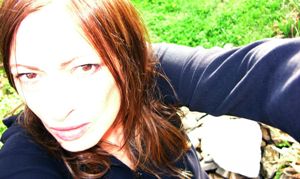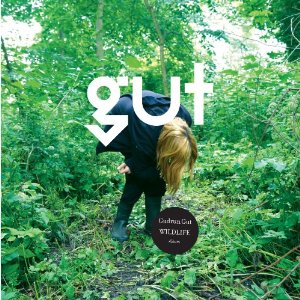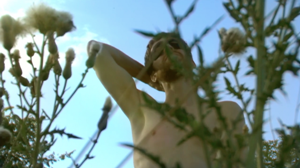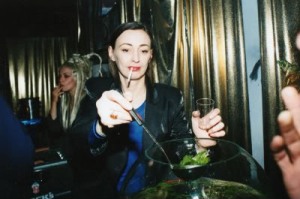In the 80s, Germany did not have an infrastructure for independent music, but it started. America and England were the masters of pop then. I think now you can listen to very good new music from all over the world and that’s liberating.
In the 80s, Germany did not have an infrastructure for independent music, but it started. America and England were the masters of pop then. I think now you can listen to very good new music from all over the world and that’s liberating.

We’re really lucky in that earlier this month we got a chance to chat to the great Gudrun Gut. We’ve always admired her work, and she’s been one of the true creative constants this last 30 years or so, certainly in Berlin: right from her time in Einstürzende Neubauten back in the early 80’s. But we hold a candle for her here on Incendiary for her work as head honcho of the truly great Monika Records, and also for her solo records, which are fabulous. Email interviews can be difficult but we’re glad to say Gudrun gave as good as she got! Now read on..
IN: What do you look out for in your music, what drives as a lot of the sounds are very nuanced, very subtle, concerned with atmosphere & mood.
GG: An important thing for me in music is to hear the artist in it. For me that means finding my own voice and developing my musical handwriting and “signature”. When I finished my new album and played it to some friends; and the best criticism of it for me was: “it sounds like you”. I am always aiming for that. On the other hand I have content to deliver- and to find that content I have to look for love- go inside – trust intuition and get it out. I locked myself up in the studio and only concentrated on the music: to have an absolute flow. But this is just my technique: it’s a production and creating technique I use.
The tracks start in creative chaos – that’s the fun part for me, the creation – out of nothing – the joy! And then the structure becomes more and more clear. That’s when you have to put the most work into it, and it drives me mad sometimes to organize my chaos! Finishing the tracks is the hard one, but I like to get the essence of my work down, the essentials. And I like simple ideas, simple clear things. I just let it all cook for a while, like marmalade. On Wildlife, I was very glad to have Jörg Burger helping me with the mix in the end- I couldn’t hear the songs anymore.
As for moods and atmosphere, well they are important because what drives me is the reflection of life, politics, truth, love, emotions, and that all belongs together.
IN: Your music, especially the last two LPs, Wildlife & Baustelle were very sensual records, very sexy, you used sounds in a very suggestive and emotional way. Can you tell us about these LPs?
GG: My album project together with AGF as GREIE GUT FRAKTION (for Baustelle) was a really great experience for me because I love working with other people and it was especially interesting with Antye – because she is such a skilled producer- I mean technically.
Mostly I do the programming and production when working with other artists and with Antye I found I had such a skilled and driven partner – it was just fun exchanging ideas, feeding of each other and getting this album done. The whole album theme is about constructing buildings, construction work: and we were using lots of field recordings, etc.
IN: Yet they are very different records, one concerned with your own back yard, the other, picking up on the “bauen eine neue stadt” idea / song from Palais Schaumburg
GG: Yes and that’s down to the fact that one is a collaboration – and the other is very much solo. Antye didn’t know that song from Palais Schaumburg- Antye grew up in East Germany and was not so familiar with the West German pop underground. So this was interesting to do. And the subject (building a new city) fitted our construction theme perfectly!
My new album, Wildlife, is a strict solo album- it refers more to the idea of, “I put a record on”. I recorded it entirely on the countryside- no city distractions but concentration on nature and my reflections on life. The leitmotif is nature, in combination with our daily worldwideweb life. It’s about protecting our own wildlife. If you know what I mean. Garden is an important track, the garden inside and outside- guerrilla gardening, Urban gardening, bringing nature back into our focus without being too romantic about it. Innovation and making things better. Touching ground, using what you’ve got and making something out of it, in order to feel “yourself”.

Gudrun looking for her wildlife
You know, it’s an illusion but it is our world. It’s a fiercely independent record too. It’s about being inside and outside, and because of this I’m transcending my emotions and my experiences into something bigger and more abstract, making it accessible for others.
Lyrically, I like to keep matters open-ended: the listener should be able to reflect their own experiences and life into what I say, somehow, because I used to do that and still do when I listen to songs – I take just some sentences and put them into my world- make them my own and make my own creation inside this other vessel, more fun and more liberating. Anyway I don’t want to put my problems on anyone- it’s more a reflection of ideas. Giving something…
IN: Do you think your music is in any way whimsical or teasing?
GG: Whimsical? A nice word – I don’t know it. Has nothing to do with being a wimp I hope?? Ha ha!
IN: No it means dreamy, I suppose. It CAN mean wimpy, but I suppose that’s not a Berlin thing, being a wimp? You’re all so serious and hard 😉
GG: Haha. Dreamliner…. No I’m a Nice Person! Thomas Fehlmann said to me: “your new album is pretty daring.” I am still trying to understand this, but I was always a daring woman and I don’t give time to fear and I don’t like to get bored. Otherwise, I’d say I’m a pretty serious art-worker. And I don’t think my music is all that strange really. Talking of dreamy, shall I throw down a challenge? Look at my Garten Video, produced by by Sonja Bender: I was so sick of seeing “Naked Girls Dancing In Videos” – I wanted a twist, I wanted it sensual, weird and arty as well. I like the “Zombie children” at the end. It’s absurd.

“We hate you little girls” – video still from Garten
IN: I note that you’re very keen on remixes, collaborations, why is that? Do you feel you can pass your creations over fully to others to reinterpret?
GG: Yes. Remixes are interesting- on one hand it’s a tool for the clubs- because on Monika we don’t do real club music – its more artist orientated music. But I like the club scene and the club world is very inspiring. There is a lot of good stuff coming from there. I know a lot of people in that world and Berlin is a very electronic/club-orientated city – musically it’s everywhere. And yes, I always loved working with people and with remixes you hear their interpretations- I think the result is especially interesting if the original music is more song based. Suddenly there is a connection between two artists, just because of the remix. It’s a context thing.
IN: Forgive me, but you’ve been involved in a lot of acts and projects in your time in this business…
GG: A long time ago, I was really young and shy. Punk was a very important statement for my coming out as an artist as suddenly everything was possible: music, art and film were close together in those Berliner days. We played a lot in art galleries and did live music for films. Every day was super exciting and we lived our wild youth in every minute. I worked in several bands with friends; pretty much all the time and we organized our own festivals, printed the poster in the university or went drinking and dancing.
In the 90s I started the label Monika and the Ocean Club Radio Show with Thomas Fehlmann. Oh and lots of deejaying. You could say that my social years from 97 till 07. Now I feel like I’ve restarted. Actually, I see 2007 as the year I came back to my own music after doing 10 years or more of networking. I’m very happy to be back in the creative process and I’m glad I had a break from it as well.

Gudrun Gut – the social years
IN: What is making music like now as opposed to when you started out back in the 80s?
GG: In the 80s, Germany did not have an infrastructure for independent music, but it started. America and England were the masters of pop then. I think now you can listen to very good new music from all over the world and that’s liberating.
IN: Berlin must have changed a lot musically, but it always had an edge of experimentation (I’m talking more T-Dream and Klaus Schultze than Bowie), what do you reckon the major changes are?
GG: Sure I listened to Klaus Schulze in the late 70s, as well as Neu!, which is still my favourite – but talking about the 80s, you know Bowie was very important somehow. Did you hear his new single about his Berlin Memories?
IN: I love Neu!, especially Klaus Dinger’s follow up band La Düsseldorf – I think that’s my favourite German music of all, those first 2 La Düsseldorf LPs. And yes I heard Bowie I thought it was great. You too?
GG: Yes I love it. And I love to be surprised – Änderungen (Changes) now that was one surprise!!! Talking of the past, I am actually compiling music as part of a big (Martin) Kippenberger exhibition here in Berlin at Hamburger Bahnhof– and it’s based around the beginning of the 80s when he lived and worked here. There was a lot of interesting stuff in the air – new German music as well as music from other countries. Berlin had this New York connection as well- we loved the no wave stuff- DNA, Glen Branca, Lydia Lunch, Contortions, Mars, Bush Tetras. And we did play in New York quite often, too.
IN: You must have some good stories from the last 20 odd years or so…
GG: Lots of unhappy love stories! Ha. Anyway…. hmm… I played the studio 54 with Nina Hagen- we put our cab driver on the guest list and it made his month! We lived at a friend’s place in New York and took his niece out, she was 16 and our lesbian friend Adele couldn’t keep her hands off her- the girl didn’t come home that night. Our friend was furious- he hated the idea that his little girl “went lesbian”. We actually had to sweep the whole loft as a punishment. But we were open then. Gender and relationship questions were openly tried out and discussed.
IN: Tell us about Monika Records: you always put out great records by interesting artists before anyone hears of them (e.g. Julia Holter)
GG: 🙂 very nice of Julia! I’m flattered. I’m very proud of the Monika catalogue, it’s lots of interesting female artists doing their thing. The series 4Women No Cry -that Julia was on – (review here, from back in the day) is my packaging idea to present new artists from different countries on one album – to introduce them. Each artist has about 20 minutes and its really nice to see what great music is done all over the world. the information of what’s going on is going everywhere by now- for example Lucrecia Dalt (or ‘The Sound of Lucrecia– I just did a remix for her new album on Hem records) is a young artist from Columbia- she is a great composer and works live with a self-made loop machine that her father helped build. And then there’s Natalie Beridze- a fantastic artist from Georgia. Or Manekinekod from Greece- she is an activist herself in Athens- organising gigs and doing radio shows and great music. And then I have Barbara Morgenstern who is a wonderful mature artist with about 6 albums on Monika already. It’s great to see how she developed! It’s really inspiring and motivating for me.
IN: .And it’s a very female / electronica oriented label (sorry can’t really put it any other way) why did you do that? You were pretty ahead of your time in that regard.
GG: Nicely put, ha ha! Why do I do that? Because it interests me- I am a female producer myself and naturally I like to hear what other women are contributing to pop culture. I think you should not ask me- instead you should ask other labels or festivals why they only program male music, hahaha! That would be an interesting question.
Anyway I’m driven by my own interest in life and art and music.
